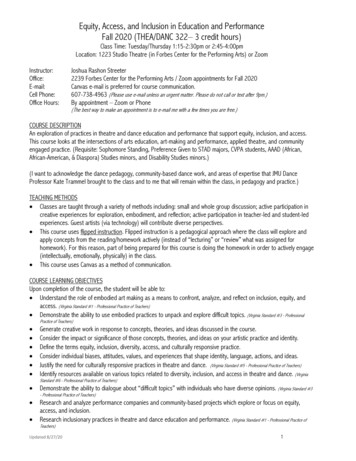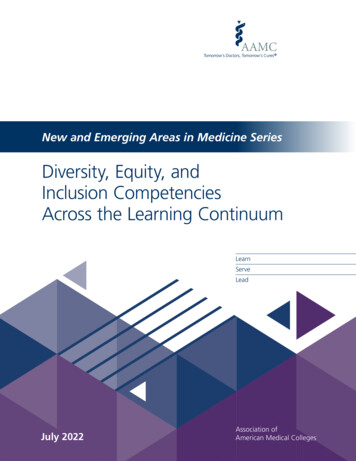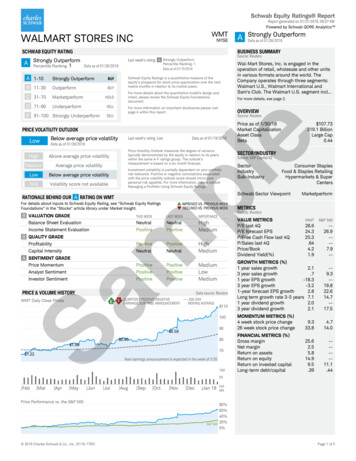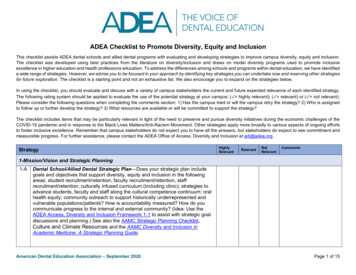
Transcription
Equity, Access, and Inclusion in Education and PerformanceFall 2020 (THEA/DANC 322– 3 credit hours)Class Time: Tuesday/Thursday 1:15-2:30pm or 2:45-4:00pmLocation: 1223 Studio Theatre (in Forbes Center for the Performing Arts) or ZoomInstructor:Office:E-mail:Cell Phone:Office Hours:Joshua Rashon Streeter2239 Forbes Center for the Performing Arts / Zoom appointments for Fall 2020Canvas e-mail is preferred for course communication.607-738-4963 (Please use e-mail unless an urgent matter. Please do not call or text after 9pm.)By appointment – Zoom or Phone(The best way to make an appointment is to e-mail me with a few times you are free.)COURSE DESCRIPTIONAn exploration of practices in theatre and dance education and performance that support equity, inclusion, and access.This course looks at the intersections of arts education, art-making and performance, applied theatre, and communityengaged practice. (Requisite: Sophomore Standing, Preference Given to STAD majors, CVPA students, AAAD (African,African-American, & Diaspora) Studies minors, and Disability Studies minors.)(I want to acknowledge the dance pedagogy, community-based dance work, and areas of expertise that JMU DanceProfessor Kate Trammel brought to the class and to me that will remain within the class, in pedagogy and practice.)TEACHING METHODS Classes are taught through a variety of methods including: small and whole group discussion; active participation increative experiences for exploration, embodiment, and reflection; active participation in teacher-led and student-ledexperiences. Guest artists (via technology) will contribute diverse perspectives. This course uses flipped instruction. Flipped instruction is a pedagogical approach where the class will explore andapply concepts from the reading/homework actively (instead of “lecturing” or “review” what was assigned forhomework). For this reason, part of being prepared for this course is doing the homework in order to actively engage(intellectually, emotionally, physically) in the class. This course uses Canvas as a method of communication.COURSE LEARNING OBJECTIVESUpon completion of the course, the student will be able to: Understand the role of embodied art making as a means to confront, analyze, and reflect on inclusion, equity, andaccess. (Virginia Standard #1 - Professional Practice of Teachers) Demonstrate the ability to use embodied practices to unpack and explore difficult topics. (Virginia Standard #3 - Professional Practice of Teachers)Generate creative work in response to concepts, theories, and ideas discussed in the course.Consider the impact or significance of those concepts, theories, and ideas on your artistic practice and identity.Define the terms equity, inclusion, diversity, access, and culturally responsive practice.Consider individual biases, attitudes, values, and experiences that shape identity, language, actions, and ideas.Justify the need for culturally responsive practices in theatre and dance. (Virginia Standard #5 - Professional Practice of Teachers)Identify resources available on various topics related to diversity, inclusion, and access in theatre and dance. (VirginiaStandard #6 - Professional Practice of Teachers)Demonstrate the ability to dialogue about “difficult topics” with individuals who have diverse opinions. (Virginia Standard #3- Professional Practice of Teachers)Research and analyze performance companies and community-based projects which explore or focus on equity,access, and inclusion.Research inclusionary practices in theatre and dance education and performance. (Virginia Standard #1 - Professional Practice ofTeachers)Updated 8/27/201
Gain awareness of aspects related to equity, access, and inclusion that inform management, design/tech, and otherroles within the field.REQUIRED TEXTS & MATERIALS/COURSE REQUIREMENTS Let’s Get Real: Exploring Race, Class, and Gender Identities in the Classroom by Caldwell and Frame Black Appetite. White Food.: Issues of Race, Voice, and Justice Within and Beyond the Classroom by Lyiscott All other required readings and resources are available through the JMU library website, posted on Canvas, or online(links provided on Canvas). Binder to keep class handouts and syllabus in. (Bring to class each day, we will refer back to handouts.) Check Canvas E-mail and the Course Page on Canvas on a Regular BasisCOURSE ASSIGNMENTSIn Class Participation & Reflection (20%) Participation includes: being present, on time, and engaged; participating fully to the best of your ability; sharingairtime/ being respectful of others; coming to class prepared to teach and/or bringing needed materials to engage inthe planned activities. Throughout moments of the course you will be asked to lead – as a speaker, as a facilitator,as a listener-reporter, etc. These roles directly tie to course objectives and allow you to practice the skills offacilitation around and through topics of equity, access, and inclusion. This planning, prep, and delivery counts asparticipation. You will earn daily points tracked by you and the professor. Please come see me at any moment todiscuss your progress or participation points.Reading/Video Responses & Homework (30%) Throughout the course you will be asked to reflect on your experiences and respond to the course readings andvideos. Due to the instructional methods of the course (flipped instruction), it is critical that you stay on top of theclass readings/videos.Race & Ability Unit Projects - (15% in total - three of these, each 5%) Within some content units (race and ability), you will complete a short project. These projects range in modality(written, performative, etc) and range in group size (whole group, small group, paired, or individual). Each projectwill be explained in class and a detailed rubric will be provided.Final Performance Project (20%) Individually, you will create a performance piece that weaves together movement and text. This project has severalscaffolded steps and check-ins throughout the semester and intentionally weaves together theory and practice,personal identity and social constructs in the world, and voice and body. When shared, this is expected to be a“finalized” performance. (Late work is not accepted.)Final Reflection Paper (15%) At the end of the course you will individually reflect on your experiences, course readings/materials, interactions withguest artists, and takeaways for your own practice. The final paper serves as both a reflective tool and a summativeassessment, please take detailed notes throughout the course. This is a “take-home final exam”. (Late work is notaccepted.)IMPORTANT NOTES ON COURSE ASSIGNMENTS: All lesson plans should follow the given template and be typed in 12-point Times New Roman font with one-inchmargins. (Single spacing is okay in a lesson plan.) Part of the course pedagogy is that your script the lesson. As rule,italics means the facilitator is speaking. Copying a lesson plan counts as plagiarism, this course asks you to createoriginal lesson plans as part of the learning process. All lesson plans should be thorough enough for someone elseto pick up and facilitate.Updated 8/27/202
All reflection papers should be typed in 12-point Times New Roman font, double-spaced, and with one-inch margins.Readings should be cited in MLA/APA when necessary (borrowing an idea or language from a text).MLA Citations (in-text and works cited) are required for any work (lesson plan, research paper, discussion post,project, power point presentation, etc). [APA is accepted for majors outside of CVPA.]In-class facilitations are equivalent to a written exam or scene sharing in a performance class. In-class facilitationscannot be made-up for any reason. If you cannot teach on the assigned day, it is your responsibility to find a groupto switch with. This does not fall on the responsibility of the instructor.Please note that class deconstructions and planning workshops teach new skills needed for application.EXTRA CREDITExtra credit is not given in this course.EVALUATIONRubrics will be given for each assignment one the same day the assignment description sheet is discussed in class.Please refer to these documents as you are working. All assignment descriptions and rubrics are available on Canvas aswell.LATE WORK POLICYLate work is given half credit, and then a grade of zero after 24 hours has passed. Work is considered late if it is notturned in at the beginning of the class period for which the assignment is due (work turned in during or after class isconsidered late). Click on your Canvas submission to make sure it uploaded correctly! Computer or printer problems donot constitute a valid excuse for late work or tardiness to class. If absent (physically) from class, the work is still due(virtually) on the assigned day and time. Late work is not accepted for work due during/at the final exam period.Exceptional situations with documentation are handled on a case-by-case basis (medical reasons, family emergency, orapproved university absence in advance). (This may shift, due to COVID-19.)GRADING SCALEA 100-93.0A- 92.9-90.0B 89.9-87.0B 86.9-83.0B- 82.9-80.0C 79.9-77.0C 76.9-73.0C- 72.9-70.0D 69.9-67.0D66.9-63.0D62.9-60.0F59.9-0Theatre and Dance Majors need a C or better (not a C-) in the course in order to count toward the major.GRADING POLICYGrades will usually be posted on Canvas within two weeks of submitting a paper/project during class. If you have aquestion about a grade once it is posted, please contact the instructor within 7 days of the grading being posted to setup a meeting. Contacting the instructor after the 7-day window does not guarantee a dialogue about the grade given. Tobe fair to all students, grades will be calculated to two decimals and not be rounded up.FINAL EXAMThis course will meet during the final exam time as listed by the Registrar’s Office.ATTENDANCE Class attendance is vital for your personal success in the course and for creation of a dynamic learning community.Class participation and class experiences cannot be made up (dance and theatre are experiential). If you are absentfor any reason (excused or unexcused), it is your responsibility to obtain any information missed and make sure thatany work due is turned in. See note above about in-class facilitations in regards to attendance- the fourth bullet point under “Important Noteson Course Assignments”. NON-COVID RELATED ISSUES: With prior approval or in extreme instances, absences may be excused for the followingUpdated 8/27/203
reasons: emergency situations or observance of a religious holiday approved in advance. Documentation in hard-copy mustbe presented in advance or within 48 hours of the class absence.COVID RELATED ISSUES: Quarantined students can attend class in real time for the selected “in-person” classes. Ifquarantining, you must notify the professor ahead of time. OR, if sick enough to be absent, students are to contact theUniversity Health Center (UHC) via the UHC reporting website. Students enrolled in distance learning that are not inHarrisonburg must also contact the health center. The UHC will communicate with the Dean of Students (DoS) Office ifstudents request that their faculty be notified of their absences. Students should not contact the Dean of Students Officedirectly; notifications will be filtered through the UHC. The Dean of Students Office will notify instructors of absences forstudents and state that a student will be absent due to illness. DoS will only disclose the reason for the absence if studentsspecifically request that it be shared. The Dean of Students Office notification is a courtesy for the student and does notexcuse any absences.Please see the Course Catalogue for an explanation of appropriate documentation for absences, notification ofpotential scheduled absences, and the university’s stances on attendance policies.SCHOOL OF THEATRE AND DANCE CLASS VALUE STATEMENTThe classroom is a unique community in which students and faculty come together to promote learning and growth.The classroom is a vital and critical space that serves as the foundation of your education in the School of Theatre andDance. Through class preparation, daily attendance, and active participation, you will gain the skills and tools to furtherdevelop your craft. The skills you learn in the classroom are further amplified and tested through practical applicationduring production, fieldwork, and in the shops and rehearsal spaces. In order to have a classroom that functions as aspace for learning (which includes risk-taking, theory to practice, experiential learning, and collaboration), the facultyencourage you to make your best effort to prepare, be present (mentally, physically, and emotionally), and activelycontribute. The classroom is only as successful as you make it.SCHOOL OF THEATRE AND DANCE DIVERSITY STATEMENTThe School of Theatre and Dance at James Madison University believes that equity, access and inclusion are moralimperatives and artistic obligations. Diversity—in the stories we represent, the students we serve, and the audiences weengage—is vital for the health and relevance of contemporary performing arts practice. The School of Theatre andDance, therefore, welcomes diversity of perspective, race, ethnicity, religion, socio-economic status, gender identity,sexual orientation, and ability.COURSE CREDIT HOURSMost students find they need to spend about two to three hours on homework and assignments outside of class for eachcredit hour they take. Please talk to the instructor if you need help with staying on top of your assignments or strugglewith project-based learning. Being proactive is essential to your success in this course.SYLLABUSThe instructor reserves the right to make changes to the course syllabus and course calendar. If there is no class (for anyreason, like inclement weather), there may be Canvas assignments to be completed as a class replacement. (The syllabusand course modalities may shift more throughout the semester due to COVID-19.)Updated 8/27/204
SPECIAL CONSIDERATIONS FOR A THEATRE & DANCE COURSEOUR WORK SPACEThe classroom is a special environment in which students and faculty come together to promote learning and growth. It isessential to this learning environment that respect for the rights of others seeking to learn, respect for theprofessionalism of the instructor, and the general goals of academic freedom are maintained. Differences of viewpoint orconcerns should be expressed in terms that are supportive of the learning process, creating an environment in whichstudents and faculty may learn to reason with clarity and compassion, to share of themselves without losing theiridentities, and to develop an understanding of the community in which they live. Student conduct that disrupts thelearning process shall not be tolerated.PEDAGOGY & PRACTICEPracticing the pedagogy being taught requires a commitment to the work. Often education classes have this disconnectwhere we say one thing, but our actions are another. Professor Streeter works actively to disrupt this model byintentionally engaging in the pedagogy being explored. This requires a lot of the instructor, but the process of teachingalso includes the student. What might this require of you? How might we work together to achieve this goal? Considerwhat you might individually do to bring an open-mind, a focus, and a dedication to the craft. While you are a “student” inthis course, you are simultaneously an “community member”. Each action and each choice directly impacts (positively ornegatively) your journey and the journey of your classmates. Professor Streeter is working towards more inclusivelanguage and actions, towards being a co-conspirator with students, and towards being more reflective. ProfessorStreeter commits to the self-work, the time, and the energy that is needed to understand inequity, oppression, andprivilege and understands that I both simultaneously benefit from and am oppressed by educational systems. As we movethrough the course, think about what you are working towards and what you commit to.PHYSICAL CONTACT/TOUCH/RISKThe course usually includes activity that by its very nature includes an element of physical risk. (For example, whenengaging in the theatre activity “People, Shelter, Storm” or “This Setting Needs”.) Instead, I have opted to have only afew necessary classes face-to-face. Most of the course will be delivered via Zoom. When in the face-to-face socially distantclassroom, students are encouraged to remain alert, follow directions, and be aware of potential hazards in workingindividually or with others. Please exercise common sense and caution, both in the classroom and outside of class.Training in dance and theatre often incorporates touch as a means of gathering, processing, and communicatinginformation. While we encourage receptivity to this powerful learning tool, and as much bravery as is safe for you and theclass, we also acknowledge that our bodies carry personal histories, and that all our experiences are stored in ourtissues. Ultimately, in this class as elsewhere, you have final authority when it comes to your body. When a class activityinvolves physical contact, you have the option to request or create an alternative approach. We ask also that you bemindful of other students’ boundaries in this regard, seek permission when appropriate, and give due respect to thepotency of touch.COURSE CONTENT POLICYPlease note that students will not be excused from reading, viewing, or discussing readings or performances because oftheir content. If you anticipate any problems engaging with the course content, you must speak with the instructor by theend of the first week of class. This work is hard, the content is hard, and the dialogue is hard – this is social justiceeducation.Performance provides a space and place to wrestle with difficult topics and encounter viewpoints and identities differentthan our own. We needn’t all agree, but we must all work together to create and maintain a safe and respectful classroomin which everyone can learn.Updated 8/27/205
DRESSWe will be moving in this class. You are expected to wear comfortable, appropriate clothing that you can move in. Clothingthat does not allow you to participate in the day’s activities will result in a zero for daily participation and attendance.When completing fieldwork in schools or elsewhere in the community, it is expected that you dress business casual.Please remember that you are a guest in the space and representing JMU. Business casual attire is expected in mostenvironments when working with young people. If you have a question about what may or may not be appropriate to wearduring fieldwork, please discuss with the professor before entering your fieldwork site.ELECTRONICS (Face-to-Face Class)Drama/theatre requires a community in which each member is fully present. NO electronics (phones, computers, tablets,iPods, etc.) will be permitted in a face-to-face class unless previously arranged with the instructor. Please put electronicsaway before class begins and DO NOT take them out until class is over. Put wearables (like an iWatch) on theatre mode. Ifusing electronics during class, you may be asked to remove yourself from the class. You are expected to be fully present,physically and mentally, during each class. In the case of using technology as part of a lesson, the instructor will clearlyindicate when electronics are allowed to be out and when electronics should be put away. When using electronics as partof a lesson, please use them only as instructed/intended and exercise best judgment.ZOOM (Digital Classroom)If meeting via Zoom, it is expected that you are in a location where you can move, explore, and play. You are dressed andprepared for class, just like in person. Ensure that you are sitting up (not laying down in bed on your phone) and areusing a laptop to Zoom in on (if possible). The Zoom session will be highly interactive and if you are unable to participate,it will impact your participation points.FOOD/DRINKIn a drama/theatre education course we are up on our feet and active, just like a performance class. For this reason, foodis not permitted during instructional time.Updated 8/27/206
Daily Course and Assignment Calendar(Subject to change at instructor’s discretion.)Assignments are due at the start time of class on Canvas.WEEK 1: Community Building & UnpackingThurs, Aug 27WEEK 2: Community Building & UnpackingDUE: Five Question AssignmentTues, Sept 1READ/RESPOND: “The Art of the Question”; The Art of RelevanceThurs, Sept 3READ/RESPOND: Animating Democracy; Drama and Diversity; Liz Lerman Toolbox Foundations[Starting Week #3: Every Class, Students Take Over Reading the Land Acknowledgement– schedule can be found on the interactive calendar on Canvas]WEEK 3: Community Building & UnpackingREAD/RESPOND: Chapter 1 & 2 in Let’s Get RealTues, Sept 8Thurs, Sept 10READ/RESPOND: Chapter 3 & 4 in Let’s Get RealWEEK 4: RaceTues, Sept 15READ/RESPOND: Chapter 5 in Let’s Get RealThurs, Sept 17READ/RESPOND: Chapter 1 & 2 in Black Appetite. White Food.WEEK 5: RaceTues, Sept 22READ/RESPOND: Chapter 3 & 4 in Black Appetite. White Food.Thurs, Sept 24WEEK 6: RaceTues, Sept 29Thurs, Oct 1WEEK 7: RaceTues, Oct 6Thurs, Oct 8WEEK 8: AbilityTues, Oct 13Thurs, Oct 15WEEK 8: AbilityTues, Oct 20READ/RESPOND: Chapter 6 & 8 in Black Appetite. White Food.DUE: Race Unit Project 1READ/WATCH/RESPOND: Artist Connections – Material on Interactive Calendar on CanvasREAD/WATCH/RESPOND: Artist Connections – Material on Interactive Calendar on CanvasDUE: Final Performance Project Check-InGuest Speaker – We will have a guest workshop from Megan Nevels, AssistantEducation Director at Anti-Defamation League in Los Angeles. The calendar will shift once this date is finalized –this is a placeholder for when things move around a bit, the workshop will be between Sept 15 and Oct 8.DUE: 48 hours before guest lecture – A question for Megan on Canvas Discussion BoardREAD/WATCH/RESPOND: Artist Connections – Material on Interactive Calendar on CanvasDUE: Race Unit Project 2READ/RESPOND: “People First Language”, Other Foundational Reading TBDREAD/WATCH/RESPOND: Artist Connections – Material on Interactive Calendar on CanvasDUE: Final Performance Project Check-InREAD/WATCH/RESPOND: Artist Connections – Material on Interactive Calendar on Canvas(2-Day Fall Break)Updated 8/27/207
WEEK 9: AbilityTues, Oct 27Thurs, Oct 29READ/WATCH/RESPOND: Artist Connections – Material on Interactive Calendar on CanvasREAD/WATCH/RESPOND: Artist Connections – Material on Interactive Calendar on CanvasDUE: Ability Unit ProjectWEEK 9: Gender & Sexual IdentityREAD/RESPOND: Chapter 6 in Let’s Get RealTues, Nov 3Thurs, Nov 5READ/WATCH/RESPOND: Artist Connections – Material on Interactive Calendar on CanvasDUE: Final Performance Project Check-InWEEK 11: Gender & Sexual IdentityREAD/WATCH/RESPOND: Artist Connections – Material on Interactive Calendar on CanvasTues, Nov 10Thurs, Nov 12WEEK 12: AgeTues, Nov 17Thurs, Nov 19Guest Workshop – We will have a workshop on “Microaggressions” by a facilitator from the College ofEducation. The calendar will shift once this date is finalized – this is a placeholder for when things movearound a bit, the workshop will be between Oct 27 and Nov 17.DUE: Prep Work/Reflection Work for Workshop TBDREAD/WATCH/RESPOND: Artist Connections – Material on Interactive Calendar on CanvasREAD/WATCH/RESPOND: Artist Connections – Material on Interactive Calendar on CanvasDUE: Final Performance Project Check-In(5-Day Fall Break)WEEK 13: Social ClassTues, Dec 1Thurs, Dec 3READ/RESPOND: Chapter 7 in Let’s Get RealREAD/WATCH/RESPOND: Artist Connections – Material on Interactive Calendar on CanvasDUE: Final Performance Project Check-InWEEK 15: Where do we go from here?READ/WATCH/RESPOND: Chapter 8 in Let’s Get RealTues, Dec 8Thurs, Dec 10DUE: Final Performance Project(Fall Break)FINAL EXAM: ReflectionTBDUpdated 8/27/20DUE: Final Reflection Paper8
Theatre for Young AudiencesSpring 2019 (THEA 310, Unique #14487 – 3 credit hours)Class Time: Tuesday/Thursday 2:00pm-3:15pmLocation: 1220 StudioInstructor:Office:E-mail:Cell Phone:Office Hours:Joshua Streeter2239 Forbes Center for the Performing ArtsCanvas e-mail is preferred for course communication.607-738-4963 (Please use e-mail unless an urgent matter. Please do not call or text after 9pm.)T/TH 11-1 or by appointment. (Additional hours each week are posted outside the office.)Sign-up for a slot outside Professor Streeter’s office or e-mail him for an appointment at a different time that works for your schedule.COURSE DESCRIPTION:This course provides an exploration of Theatre for Young Audiences (TYA) and Theatre for the Very Young (TVY). Thiscourse looks at work aimed at youth (birth through high school). We will examine the historical contexts of TYA, read playsin the TYA canon and plays working to expand or disrupt the cultural understanding of what TYA is in the United States,investigate current theatre companies focused on work for youth, and explore educational applications. Our discussionswill be framed by scene work, the viewing TYA/TVY, scholarly writing on the topics being discussed, dialogue with leadersin the field, and professional partnerships with Oregon Children’s Theatre and Arts on the Horizon.METHODS OF INSTRUCTION: Classes are taught through a variety of methods including: small and whole group discussion; active participation indrama/theatre strategies for exploration, embodiment, and reflection; mini-lecture; and fieldwork in local schools,community, or professional settings. This course uses flipped instruction. Flipped instruction is a pedagogical approach where the class will explore andapply concepts from the reading/homework actively (instead of “lecturing” or “review” what was assigned forhomework). For this reason, part of being prepared for this course is doing the homework in order to actively engage(intellectually, emotionally, physically) in the class. This course uses Canvas as a method of communication. (Please check on a regular basis.)COURSE OBJECTIVES:By the end of the semester, students will be able to: Develop a working knowledge of terms used in Theatre for Young Audiences and Theatre for the Very Young. (Virginia Standard #1 - Professional Practice of Teachers)Devise new work appropriate for a young audience. (Virginia Standard #1 - Professional Practice of Teachers)Read, analyze, and reflect on plays across and beyond the canon. (Virginia Standard #1 - Professional Practice of Teachers)Consider the role of power inherent in representational practices such as theatre performance.Understand the role of culturally responsive practice in Theatre for Young Audiences. (Virginia Standard #1 - Professional Practice ofTeachers)Articulate how and why Theatre for Young Audiences is a viable career path, legitimate art form, and relevant culturalexperience for communities.Consider the role of an artist within larger theatre programming at regional theatres or within theatre companies.(Virginia Standard #6 - Professional Practice of Teachers)Demonstrate an understanding of the relationship between artistic and educational programming in the field.Plan appropriate and engaging educational experiences surrounding a production. (Virginia Standard #2 - Professional Practice ofTeachers)REQUIRED TEXTS: Playwriting and Young Audiences: Collected Wisdom and Practical Advice from the Field by Matt Omasta & Nicole B.Adkins Drama-Based Pedagogy: Activating Learning Across the Curriculum by Kathryn Dawson & Bridget LeeUpdated 5/5/191
Plays and other required readings/resources will be available on Canvas. (You may choose to buy them on your own afterreading – up to you! Of the unpublished plays, please do not share as we have special permission from the playwrights to use in this courseonly.)ADDITIONAL COURSE MATERIALS & REQUIREMENTS: Notebook and pencil to take notes in the course/in the field. Binder to keep class handouts and syllabus in. (Bring to class each day, we will refer back to handouts.) Materials/resources for devising. (The instructor can provide certain supplies, please discuss ahead of time.) Hip Hop Theatre Workshop on March 15th. Arts on the Horizon ticket ( 8) and transportation to DC on March 23rd.COURSE ASSIGNMENTS:In Class Participation (10%) Participation includes: being present, on time, and engaged; participating fully to the best of your ability; sharingairtime/respectful of others; coming to class prepared to teach and/or bringing needed materials to engage in theplanned activities. This grade will include creating and asking thoughtful, well-crafted, and smart questions to ourguests. You will earn daily points tracked by you and the professor. If absent you cannot make up the day’sparticipation points (theatre is experiential). Please come see me at any moment to discuss your progress orparticipation points. Professor Streeter may change your daily participation grade with justification.Educational Study Guide (20%) In a small group, you will create an educational study guide for teachers. Your group will create an outline and twodrafts before turning in the third and final draft. You will receive feedback on the guide from the instructor duringeach step. The guide will be created for use by Oregon Children’s Theatre. (For this project, you will generate contentonly, not layout and design.) Late work will not be accepted.Play Quizzes in Class (15%) Over the course of the semester, you will read 16 plays (outside of the TVY unit). For each play you will have amultiple choice or short answer quiz on the play during class. If you miss the portion of class when the quiz is given itcannot be made up. The lowest two scores will be dropped.Article Responses on Canvas (15%) Through the course you will
All other required readings and resources are available through the JMU library website, posted on Canvas, or online (links provided on Canvas). Binder to keep class handouts and syllabus in. (Bring to class each day, we will refer back to handouts.) Check Canvas E-mail and the Course Page on Canvas on a Regular Basis COURSE ASSIGNMENTS











